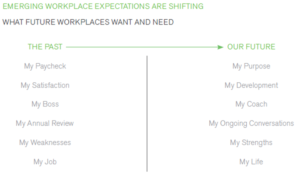If you are a baby boomer, this may come as a shock to you to see this in writing, but if you’ve experienced this yourself over the past 5 years, it may not be much of a surprise. The employee’s expectations of their employer and manager are changing.
Millennials are replacing baby boomers in the workforce. If your company employs many younger workers, you’ve been seeing this for a while. If you have a stable workforce, you are really just experiencing this for the first time and wondering how to handle the change. It is futile to resist.

[This is my electrical engineering geek showing. The zig zag is the resistor – the current goes from the source (the +) to ground (the symbol that looks like one side of a dumbbell). This is just like when lightning strikes - it looks for the shortest distance to the ground – or path of least resistance. The resistor is not doing anything in this picture because it is being bypassed by the wire.]
A recent Gallup research report (Re-Engineering Performance Management) shows that employee expectations of their employer are shifting:

For a baby boomer, this is all foreign. When did the employee ever get to dictate the terms of employment to the employer? A business owner may think that change can be delayed by just hiring older people. The issue with that is that all employees have wanted this shift to occur, but it wasn’t until the Millennials entered the workforce that it began.
All workers today want a conversation with their leaders about their career path and how it fits with the company and the rest of their life. Gone are the days of having a conversation once a year during the annual review. That was performance management – what is required now is performance development. This means that leaders today need to have a higher emotional intelligence than in the past. They need to not only be able to run a business, but they must also have some life coaching skills.
I have to admit, I am one who focuses on what needs to improve rather than what is going well. I have not historically given kudos for good work, but I know that I like to receive good feedback if I’ve met or exceeded high expectations. While I understand the benefits of positive reinforcement, the “tyranny of the immediate” tends to get my focus, shifting to the next biggest issue that is preventing easy success.
I am not a fan of quick fixes, but Ken Blanchard's book The One Minute Manager claims that you can do a lot in one minute:
- Set three goals for each of your employees, which you can review in one minute or less.
- Use one minute praise to give your employees positive feedback.
- A one minute reprimand is more than enough to express your dissatisfaction.
I’ve always used Ken Blanchard’s writings as a guide, but did he really know this wave of change was coming back in 1982 when he wrote that book? It's only about 100 pages, and has sold 15 million copies. If you haven’t taken the short time to read it, you should. The point of this is that “one minute praise” is something that I continually try to improve, since the workforce today is asking for frequent guidance and constant feedback – both good and bad.
For the business owner and experienced leaders, the working world is changing. Focus on being a coach to those for whom you are responsible. Give informal guidance often, and follow up in writing periodically. Good employees want to grow personally and professionally. Performance development should be your focus. If your employees are not looking to grow, that is where the manager is needed to either find a place where their existing skills can be helpful, or help them understand that a job elsewhere would be a better fit.
